FIRST TIME AS COMEDY (13)
By:
August 22, 2024
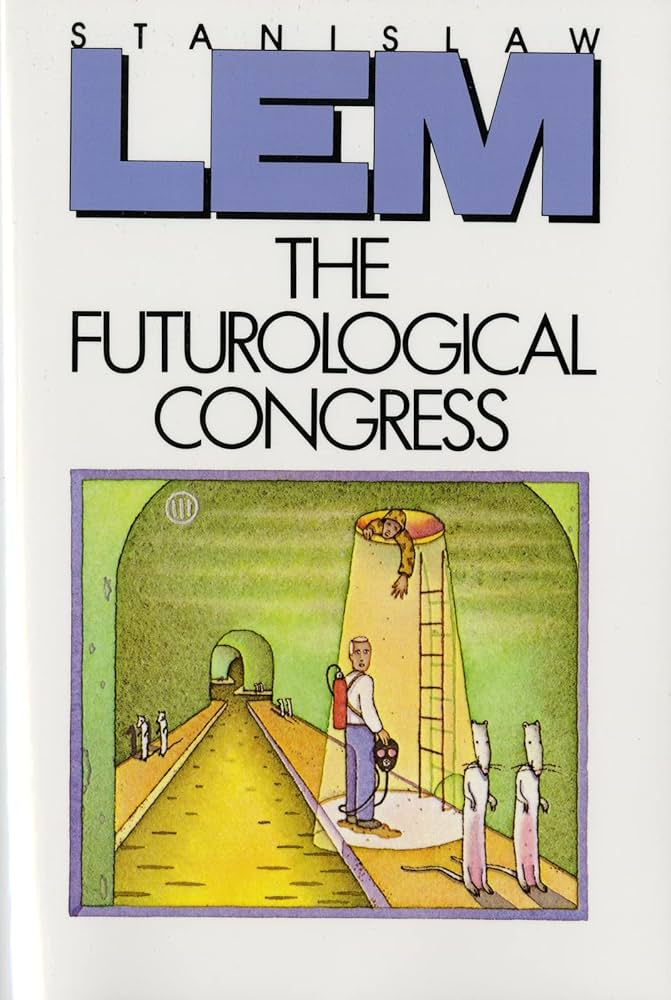
Some years ago, HILOBROW friend Greg Rowland pointed out that the 1990 movie Dances With Wolves ought to be regarded as a sentimental remake of the 1970 revisionist Western Little Big Man. The series FIRST TIME AS COMEDY will offer additional examples of this recursive (and often, though not always middlebrow) syndrome.
FIRST TIME AS COMEDY: SUPERDUPERMAN vs. WATCHMEN | WILD IN THE STREETS vs. PREZ | EMIL AND THE DETECTIVES vs. M | THE SAVAGE GENTLEMAN vs. DOC SAVAGE | GULLIVAR JONES vs. JOHN CARTER | THE PHONOGRAPHIC APARTMENT vs. HAL | HIGH RISE vs. OATH OF FEALTY | JOHNNY FEDORA vs. JAMES BOND | MA PARKER vs. MA BARKER | DARK STAR vs. ALIEN | SHOCK TREATMENT vs. THE TRUMAN SHOW | JOHNNY BRAVO vs. ROCK STAR | THE FUTUROLOGICAL CONGRESS vs. THE MATRIX | CAVEMAN vs. SASQUATCH SUNSET | LITTLE BIG MAN vs. DANCES WITH WOLVES | THE LAST BLACK MAN IN SAN FRANCISCO vs. BE KIND REWIND | LEN DEIGHTON vs. LEN DEIGHTON.
In Stanislaw Lem’s short, bleakly humorous 1971 sci-fi novel The Futurological Congress, the Gulliver/Tintin/Münchausen-esque ex-cosmonaut Ijon Tichy, whose interplanetary exploits were previously chronicled in The Star Diaries (1957), shows up at the World Futurological Congress.
This absurd event — hosted by a luxury hotel in the fictional South American country of Kostarykana, and dedicated to discussing the problems of overpopulation and resource depletion, which are leading to social and political upheaval — is so overbooked that none of the presenters actually delivers a paper. Instead, attendees like Diagoras, who has developed an artificial intelligence that is independent of mankind; and Decantor, who has invented an immortal soul — distribute hard copies of their talks, then call out specific paragraph numbers.
Which reminds me of one of my grandfather’s jokes:
A newcomer to town is invited to join a fraternal lodge, so he shows up for one of their dinners. Every now and then, one of the lodge members calls out a number (“Number Twenty-three!” “Number Forty-four!”), after which everyone else laughs heartily. Puzzled, the new fellow turns to a neighbor and asks what’s going on.
“We’ve told the same jokes so many times,” the other guy explains, “that we no longer need to tell them. We’ve numbered them, and now we just call out the numbers.”
After a while, the newcomer decides that he’d like to join in the fun. “Number Thirty-six!” he calls out. Dead silence, except for a few impatient groans.
Embarrassed and bewildered, he turns back to his neighbor. “Why didn’t they laugh?” he demands.
“You told it wrong.”
I always liked that joke — there’s something Saussurean about it.
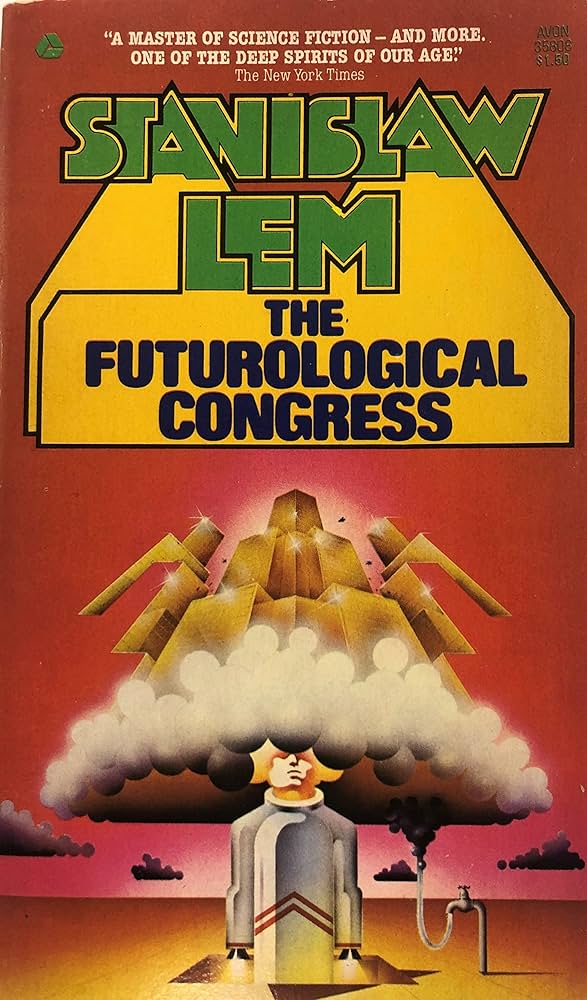
Anyway… Even before the conference begins, events take an ominous turn. For example: Rebel guerrillas kidnap Kostarykana’s American consul and start mailing his body parts to the authorities, demanding the release of political prisoners. As Switzerland’s Professor Dringenbaum explains how humanity will soon resort to cannibalism, rioting breaks out in the streets. Not to worry, though: Kostarykanan authorities introduces psychoactive drugs into the drinking water and sprays hallucinogenic gases, to calm things down; meanwhile, Tichy and other conference-goers take refuge in the sewers beneath the hotel. Which is where things get weird.
Tichy is evacuated from his underground hideout, not once — but several times. Each evacuation turns out to be a hallucination… it seems that Tichy, too, has been affected by the government’s chemical warfare. So when the military actually (?) does come to evacuate him again, Tichy refuses to leave. This turns out to be a mistake, as he’s discovered and shot by Kostarykanan counter-revolutionaries. Waking in a hospital, Tichy can no longer distinguish between reality and hallucination… Before he spirals into madness forever, the medical staff places him in a cryogenic coma. He’ll remain frozen until a future era when medicine can help his condition.
Tichy next wakes up in the year 2039, to discover himself in a utopian future — a scenario parodying H.G. Wells’s 1899 utopian novel When the Sleeper Wakes (also parodied by Woody Allen’s 1973 comedy sf movie Sleeper). Although the climate is oddly chilly, otherwise it’s a paradise. In this “psychemized” social order, one takes psychoative chemicals (psychems) to induce any sort of emotional state or worldview; “gospelcredendium” will give you a religious experience, for example, while “equaniminine” will dispel it again. This is a post-scarcity society where no one need labor… yet people tend to favor a drug that instills a strong work ethic, because work makes life meaningful. Iain M. Banks never thought of this!
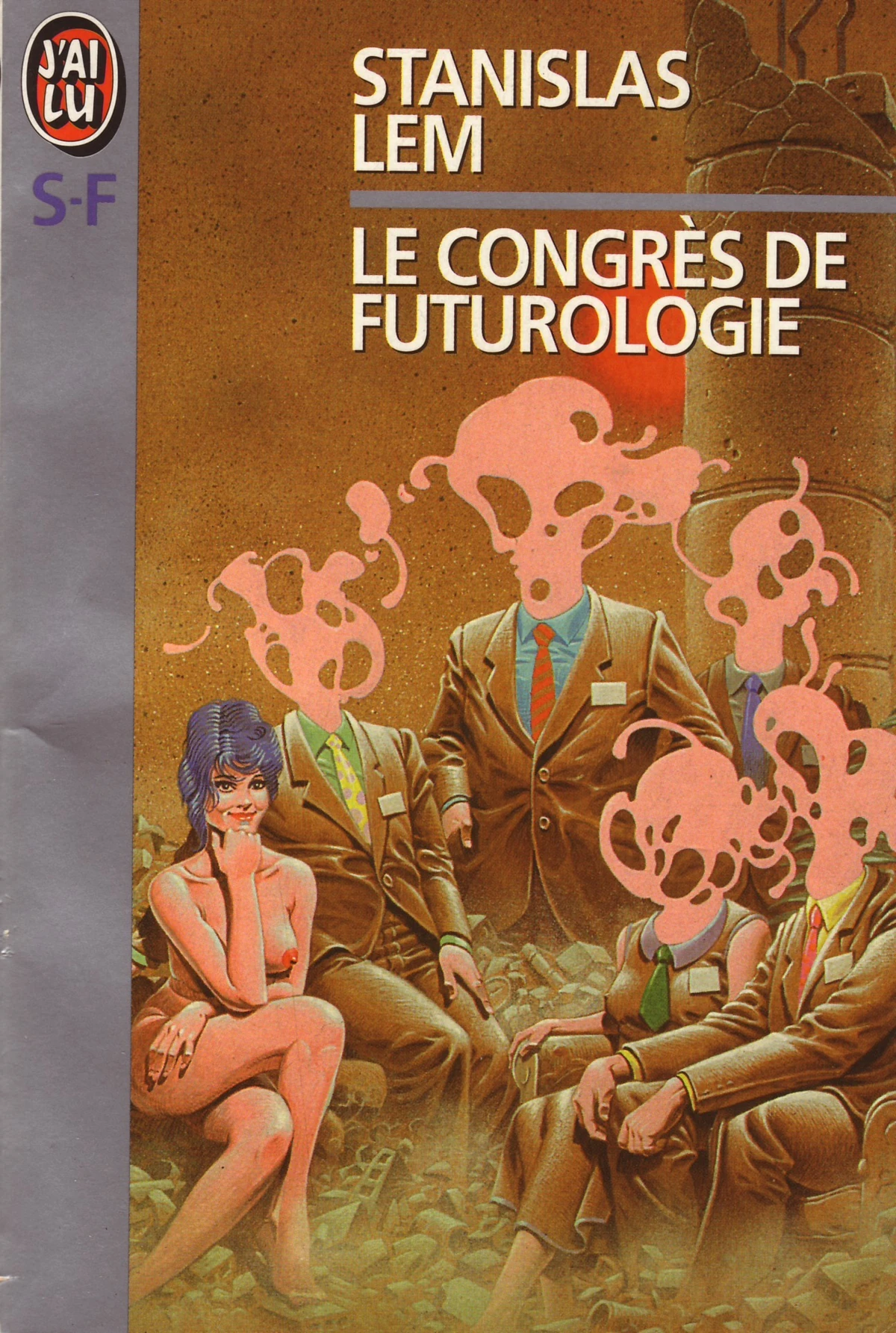
Tichy quickly becomes disillusioned with the “psychem” mentality, and resolves to stop taking any drug. When he confides his disillusion to Professor Trottelreiner, one of his fellow participants in the Futurological Congress, who was also cryopreserved and later resurrected, Trottelreiner lets him in on a secret: While their fellow utopians may believe they’re living in a post-scarcity utopia, in fact they lead difficult lives on a far-future glaciated planet… which explains why Tichy was always complaining of a chill.
The professor then gives Tichy a flask of up’n’at’m, one of the vigilanimides, a powerful countersomniac and antipsychem agent. Huffing it, Tichy sees the five-star restaurant in which they are dining dissolve. In fact, they are hunched in a concrete bunker. His stuffed pheasant turns into “the most unappetizing gray-brown gruel, which stuck in globs to my tin — no longer silver — fork”. (A reference perhaps to the phrase “the naked lunch”?)
I have no precise memory of writing the notes which have now been published under the title “Naked Lunch.” The title was suggested by Jack Kerouac. I did not understand what the title meant until my recent recovery. The title means exactly what the words say: NAKED Lunch — a frozen moment when everyone sees what is on the end of every fork.
— from William Burroughs’ introduction to Naked Lunch
With each successive dose of vigilanimides, Tichy sees increasingly bleak visions of the future world. If you thought that a vision of police robots whipping the human populace in the streets to keep order was bad, then what about a subsequent vision suggesting that the police robots are in fact humans who only imagine they’re robots? (Woody Allen’s Sleeper, the protagonist of which at one point ineptly disguises himself as a robot, again comes to mind.) Brrr…
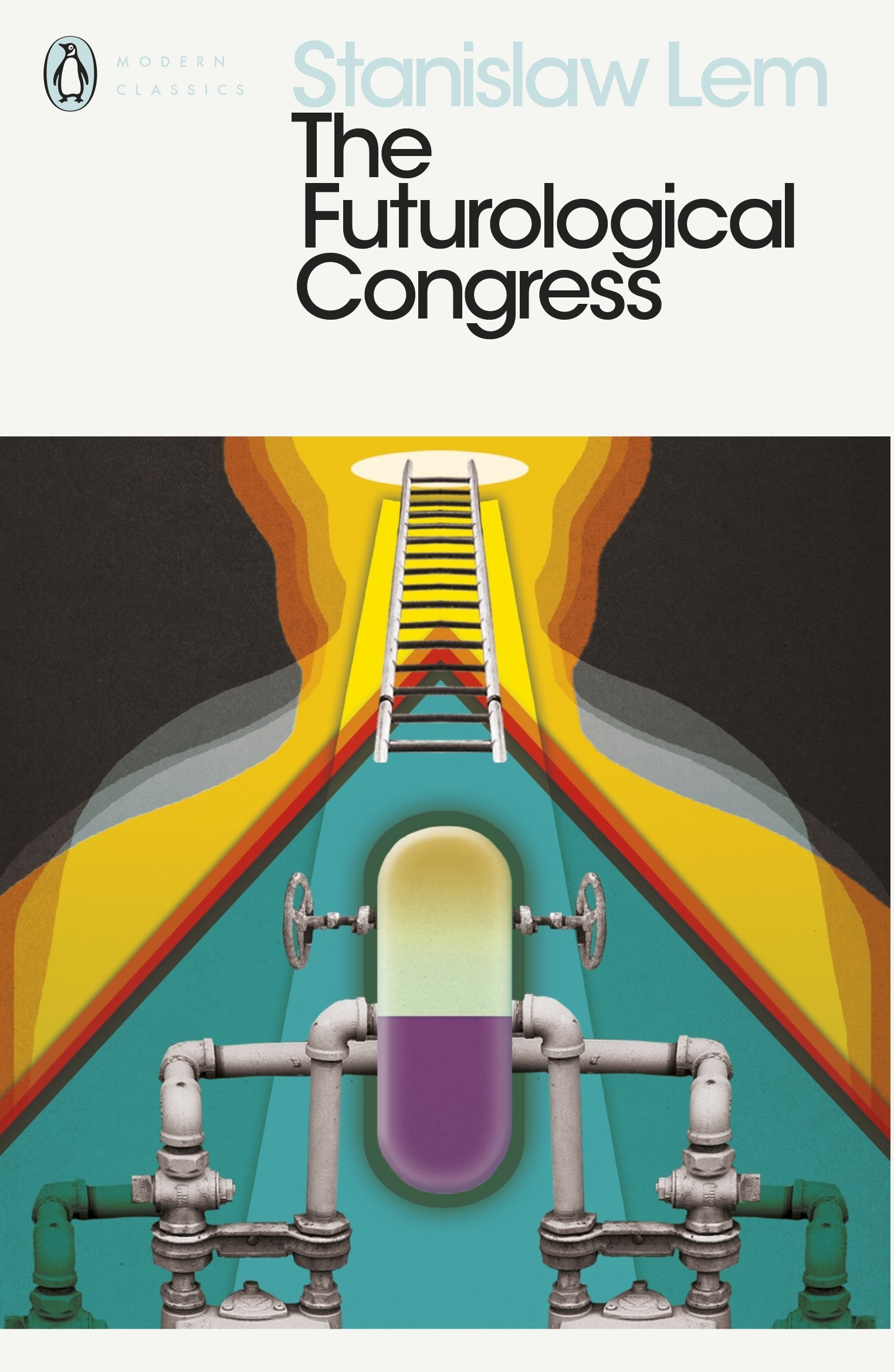
As Symington, one of the bureaucrats tasked with keeping the populace immured in illusion, proudly explains:
We keep this civilisation narcotised, for otherwise it could not endure itself. That is why its sleep must not be disturbed. And that is why you will be returned to it. Oh there’s nothing to fear — for you, this will be not only painless, but pleasurable. Our lot is far more difficult; we must remain awake, to watch over you.
Tichy tackles Symington, pushing them both out of the window of a skyscraper. Will they perish upon contact with the frozen future Earth, or will Tichy awake once again in the sewer beneath his Kostarykanan hotel?

The Matrix is a 1999 sci-fi action film written and directed by the Wachowskis. Starring Keanu Reeves, Laurence Fishburne, Carrie-Anne Moss, Hugo Weaving, and Joe Pantoliano, it depicts a dystopian future in which humanity is unknowingly trapped inside the Matrix — a simulated reality that intelligent machines have created to keep humans pacified while using their bodies as an energy source. It’s a similar scenario, in a way, to the one that Tichy discovers once he starts huffing vigilanimides… yet a less interesting one, really, since there’s an evil villain in The Matrix, whereas Symington and his colleagues are trying to help us.
When a computer programmer known by the hacker alias “Neo” becomes vaguely aware of what’s going on, he is apprehended by a sinister Agent Smith, who offers to erase Neo’s criminal record in exchange for his help with locating Morpheus, an anti-Matrix guerrilla leader whom they claim is a terrorist. When Neo refuses to cooperate, they neutralize him… after which he wakes up, thinking it was all a dream. But Morpheus contacts Neo, and offers him a choice between two pills: red to reveal the truth about the Matrix, or blue to make him forget everything and return to his former life. Neo takes the red pill… and ends up becoming a messiah-like leader of the rebellion against the Matrix.
Which, let’s face it, seems like just another hallucination! I don’t buy anything that happens after this point. Also, the ending of Lem’s story — nearly three decades earlier — had already parodied the notion of a heroic character tackling baddies who are keeping us all trapped in a state of illusion.
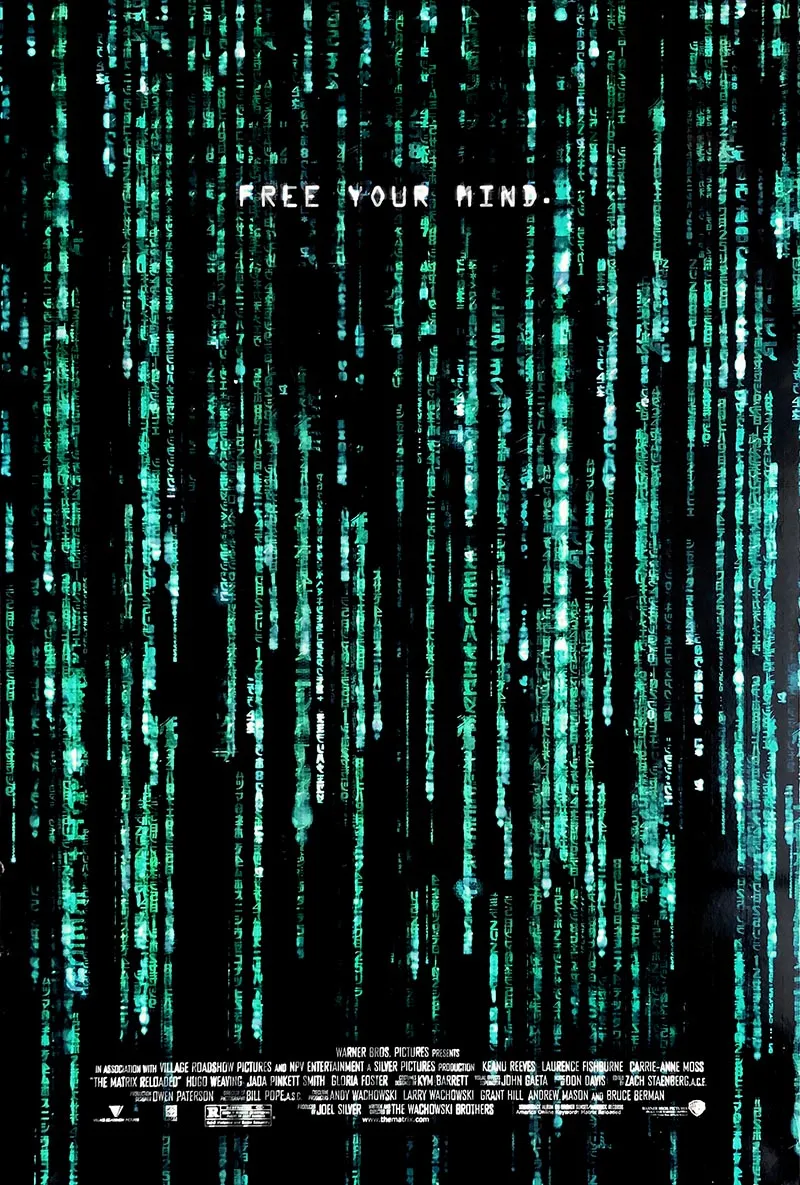
The Matrix became the second-highest-grossing Warner Bros. film of all time. Overall, it was the third-highest-grossing R-rated film at the time, just after Saving Private Ryan and Terminator 2: Judgment Day.
MORE FURSHLUGGINER THEORIES BY JOSH GLENN: SCHEMATIZING | IN CAHOOTS | JOSH’S MIDJOURNEY | POPSZTÁR SAMIZDAT | VIRUS VIGILANTE | TAKING THE MICKEY | WE ARE IRON MAN | AND WE LIVED BENEATH THE WAVES | IS IT A CHAMBER POT? | I’D LIKE TO FORCE THE WORLD TO SING | THE ARGONAUT FOLLY | THE PERFECT FLANEUR | THE TWENTIETH DAY OF JANUARY | THE REAL THING | THE YHWH VIRUS | THE SWEETEST HANGOVER | THE ORIGINAL STOOGE | BACK TO UTOPIA | FAKE AUTHENTICITY | CAMP, KITSCH & CHEESE | THE UNCLE HYPOTHESIS | MEET THE SEMIONAUTS | THE ABDUCTIVE METHOD | ORIGIN OF THE POGO | THE BLACK IRON PRISON | BLUE KRISHMA | BIG MAL LIVES | SCHMOOZITSU | YOU DOWN WITH VCP? | CALVIN PEEING MEME | DANIEL CLOWES: AGAINST GROOVY | DEBATING IN A VACUUM | PLUPERFECT PDA | SHOCKING BLOCKING.
